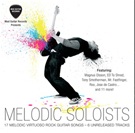How To Write More Creatively In Your Guitar Music
Do you want to write great guitar music, but struggle to do so whenever you sit down to begin writing a song? The truth is, every guitar player struggles at one time or another to make guitar music that sounds the way they want it to. Fortunately, by following the ideas of this article, you can begin writing guitar music right now that sounds much more interesting and creative.
To start writing songs on guitar that sound the way you want them to, you are going to need to incorporate many creative approaches into your songwriting process. By integrating several methods together, you will have less trouble coming up with interesting ideas since you are not held back by the limitations of merely using a single approach. This will help you maintain a consistent flow of ideas to help you write guitar music more creatively. In order to give you more strategies to use for creative songwriting, I have put together three of the most limiting approaches that are used by guitar players while writing music. For each point, I will describe why the approach is limiting and (with this in mind) how you can write songs on guitar in a way that will bring you more results. Here are three approaches that you will need to improve, change or integrate (with other approaches) in order to become more creative in your songwriting:
1. Only Writing Music Through Improvisation On Guitar, Without Planning Anything Ahead Of Time
The overwhelming majority of guitarists create their music without spending much time at all to actually think about what they want to write about. Instead, they use the approach of grabbing their guitar and playing through familiar patterns or licks until something starts to sound good. The truth is, if you are using this as your only approach for songwriting, the chances that you will NOT be able to think of great ideas increases significantly. Why is this? The reason for this is that such an approach for writing guitar songs is actually counter-intuitive to the way the natural songwriting process works. To illustrate my point, imagine that you were going to make a painting. If you wanted to pain a great portrait of someone, would you tell them to stay home while you tried to guess what they look like by randomly moving your brush around on the canvas until something resembles a face? Of course you wouldn’t. Instead, you would invite the person you are trying to paint to come to your studio, have them sit in a chair, observe the way the light hits their face and carefully paint until you have expressed your idea on the canvas as accurately as possible. This same concept rings true in music. The better you understand what you are trying to achieve with your music ahead of time, the more likely you will be to accurately convey this idea in the songs you write.
To improve your ability to accurately express yourself in the songs you write on guitar, resist picking up your guitar for about half an hour. Use this time to focus on clearly identifying what it is that you want to express in your music. Pull out a piece of paper (or use a text file on your computer) and write down as many interesting ideas, thoughts or feelings that you can think of. After you do this, select a few of the items you wrote down to use together in a song. Next, start brainstorming about how you can express these things using the various elements of music. For instance, think about how a progression of chords can express an idea, what kind of rhythm conveys certain emotions or how you can use loudness or softness to connect an idea to your music. You could even go as far as to map out the different parts of your song so that the way you write your music helps unify and connect your ideas into a complex story.
Once you have determined what you want to write your song about, use this guide to writing creative guitar riffs to get started making your music.
2. Writing Songs Exclusively On Guitar While Avoiding Other Instruments
Although you ARE writing music for guitar, it is actually very restricting to overlook using other instruments as effective tools in your songwriting process. The problem with using only guitar to write songs is that you will subconsciously restrict your songwriting options due to your own playing habits (example: You will use all the patterns, techniques, scales, etc. that you are comfortable with). In most cases, even if you want guitar to be the main focus of the music you write, you will inevitably be using other instruments throughout your song in one role or another. For example you will probably need percussion from drums, bass lines from bass guitar or music from a variety of other instruments. If you can use different instruments to write songs, you will not only gain the skills needed to write better for those instruments; but the additional perspective needed to break away from your ‘usual’ guitar playing habits and ideas.
To practice using this concept in your music, focus on writing your next 5 songs (or musical ideas at least) using any instrument other than guitar as your main songwriting tool. Some different ways you could do this include using percussion instruments to come up with catchy rhythms, using the keyboard to put together a smooth series of chords or singing melodies too come up with interesting melodies. Later after you have used this approach to come up with some good ideas, integrate the other instruments (this includes guitar) into your music. This songwriting approach may be challenging at first, but in the long run it will help you to more easily come up with high quality, creative songs.
3. Overlooking The Significance Of Each Note You Use In Your Music
Every great songwriter consistently looks to get the most out of every note he/she uses to create music. As you write music with guitar, it is important for you to use this mindset as well. For instance, in many cases, guitar players overlook the finer details in their music while using ‘chords’. In the mind of these guitarists, chords are simply big chunks that serve the sole purpose of being placed below the melody line as a part of “natural song structure”.
This mindset is extremely limiting because chords are much more interesting and useful than this. Chords are essentially made up of several individual notes that function as “melodies” when moving from chord to chord. By recognizing this, you can greatly improve the way the notes of one chord lead into the notes of another; this will make your guitar music flow much better as a whole. In order to do this on guitar, try using the following approaches:
· If you are using chords that contain one or more notes in common, retain these notes while transitioning from one chord to the next.
· Give yourself more options for creating different “melodies” within your chords by using different chord positions on the fret board to play the same chord. Try to identify at least three different positions to play the same chord and take advantage of “slash” chords that rearrange the same chord with new notes in the bass.
· Work on writing a bass line on guitar to create the foundation for your chord progressions. After you have developed a bass line, start adding notes over it until you have put together an entire chord (containing at least 3 different pitches). Then continue this process while connecting each chord you create as smoothly as possible to the next one by moving from note to note in half or whole step increments.
In addition, here are some more aspects of guitar songwriting to consider as you create music:
· Don’t use the same positions on the guitar all the time while playing a certain note. You can give yourself many more options in terms of creating great ‘tone’ by playing the same note in different positions. For instance, instead of always playing the 2nd fret of the high “e” string, try using the 11th fret of the “g” string.
· While writing guitar music, utilize different picking styles. Many guitarists only use a pick while writing guitar music, which limits their options when it comes to tone. Try adding an entirely different sound to your music by utilizing finger style parts in your music. For example, rather than using a pick to play the notes of a clean (no distortion) arpeggio, use your fingers to add a distinct, soft dynamic to your music.
The more you practice creatively using and integrating different approaches together in your guitar music, the faster you will improve your songwriting skills. In this article, you have learned various ideas to help you write guitar music with fewer restrictions on your songwriting process. By putting these ideas into practice now, you will better retain the information and get the most benefit.
Get started creating songs for guitar by coming up with your own guitar riffs with the advice in this guide to writing creative guitar riffs.
About the author:
Ryan Buckner is a pro musician, guitarist and composer. He has 7 years of experience writing helpful articles for many websites and e-zines on the topics of guitar playing techniques, how to write music and how to approach songwriting by learning the musical elements of a song.










